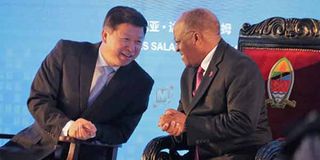4 things Africa’s founding political parties need to do to stay relevant

President John Magufuli shares a moment with the Communist Party of China (CPC) Foreign minister Song Tao at the officiating ceremony of a special session under the CPC framework in dialogue with world political parties in Dar es Salaam on Tuesday. Photo | Ericky Boniphace
What you need to know:
- These were the lessons at the close of a high-level, 2-day summit that brought together the Communist Party of China (the CPC) and 36 political parties from forty African countries on Wednesday (July 18).
Dar es Salaam. For Africa’s post-independence political parties to stay relevant in this new political age, they need to deliver on their national development agendas, collaborate, engage complementary partners like China and champion good governance.
These were the lessons at the close of a high-level, 2-day summit that brought together the Communist Party of China (the CPC) and 36 political parties from forty African countries on Wednesday (July 18).
The parties conference, which commenced July 17 at Serena Hotel in Dar es Salaam – the first such event in Africa – wrapped up with four major consensuses to strengthen Africa’s freedom parties.
Push local development
One of the things that parties need to do is explore development paths that match specific national conditions.
Political parties must be the leading forces in the course of national development, according to conference participants.
“The only way to bring about national development is to forge plans that are in line with the local environment of the respective country,” said Xu Lyu Ping, who leads International Development for the Chinese Communist Party.
Her sentiments were echoed by Chama Cha Mapinduzi secretary general Bashiru Ally, who challenged Africa’s founding parties to see themselves as instruments of development – not as platforms for hoarding power.
“Strengthening political parties is important if we are to bring about positive change in our communities,” he said. “Our parties must become thought leaders in the struggle against exploitation and underdevelopment.”
Seek partnerships
According to the CPC’s Miss Xu, opportunities like the China-led summit in Dar create opportunities for dialogue and learnings that can help African parties chart their development paths to improve the lives of their nationals.
The CPC has used a similar strategy in China, she said, urging African political powerhouses to adapt similar approaches.
Dr Nafie Ali Nafie, secretary general of the Council of African Political Parties, shares the same view. If there’s “strong cooperation and partnerships with good friends like China the future can be very prosperous for Africa,” he said.
Pursue good governance
He argued that the bulk of Africa’s strife is due to failure by post-independence governments to meet the aspirations of their people in key areas like social justice, good governance and freedom of expression.
“Those failures have caused far-reaching resentment and civil conflicts which resulted in instabilities,” said Dr Nafie. These failures effectively weaken efforts to improve people’s living conditions.
Challenges facing Africa countries today are easy to tackle – compared to those facing Western nations, according to him, but for that to happened, Africa’s political bulwarks will have to show “strong determination” and “committed visions.”
In his closing remarks, Zanzibar Second Vice President, Seif Ali Idd highlighted the role good governance can play in delivering economic liberation.
“The journey won’t succeed if we don’t wage war on corruption, ensure accountability, good governance and (if we don’t) ensure leadership that produces positive development for our countries and their people,” he said.
Africa’s freedom parties should learn from their Chinese counterparts, according to Mr Idd, whose own country has registered tremendous economic growth to become the world’s 2nd largest economy within a short time.
The two-day summit drew various cadres of senior leadership from Africa’s premier political parties.




